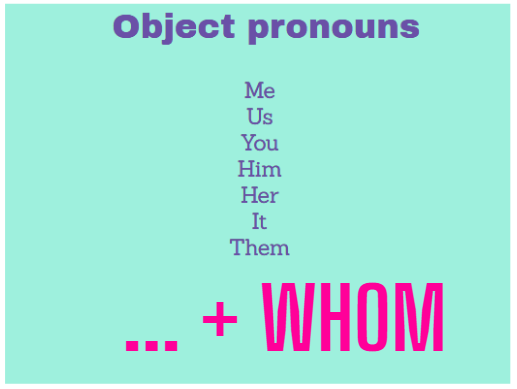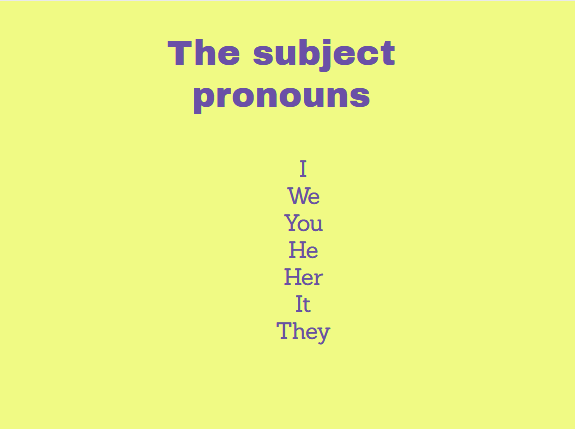The difference between who and whom may seem a little bit difficult but it is actually quite easy and simple.
However first of all let’s start off with understanding what type of words these two words are.
So let’s begin by looking at ‘who’.
What type of word is ‘who’?
- Who can be a relative pronoun. Other relative pronouns are ‘that’, ‘which’ etc. A relative pronoun tells us the person or thing that did an action. For example in the sentence ‘Simon is the person who sent you that present’. The action of sending the present was done by Simon. We use ‘who’ to refer to Simon as the person that did this action.
- ‘Who’ can also be a ‘question word’ just like ‘where’ or ‘why’. For example ‘Who was the person that wrote this book?’ The technical name for this is ‘interrogative pronoun’.
What type of word is ‘whom’?
- ‘whom’ is also a pronoun but whom is essentially an object pronoun just like ‘me’, ‘us’, ‘him’.
- It can also be used as an ‘interrogative pronoun’, but to ask for the object of an action, i.e. which person an action was done to.
To understand what object pronouns are read this link.
The subject pronouns are used when we replace the name of the person doing the action.
So instead of saying ‘Katie drove the car’, we replace the name Katie with ‘she, so we would say ‘She drove the car.’
The subject pronouns are: I, we, you, he, she, it, they.
The object pronouns are used to describe people or things which have an action done to them.
So instead of saying ‘They saw Matthew in the shop’ we can replace the name ‘Matthew’ with ‘him’ so we can say ‘They saw him in the shop’.
The object pronouns are as follows; me, us, you, him, her, it, them.
However let us remember that the word ‘who’ is used mainly as a subject.
So for example:
Question ‘Who was the person who gave David the book?’
Answers:
‘I was the person who gave David the book.’
‘We were the people who gave David the book.’
‘It was you who gave David the book’
‘It was Peter, he was the person who gave David the book.’
‘It was Sarah, she was the person who gave David the book.’
‘It was the computer, it gave David the book.’ (*For example a computer program chooses to give a certain student a book in a competition).
‘It was Don and Ana, they opened the door.’
These are all subject pronouns and who is related to them, as they tell us who did the action.
The word ‘whom’ is used as an object.

So we would use ‘whom’ to refer to the person who was given the book.
Question: To whom did you give the book?
Answers:
‘David was the person to whom, I gave the book.’
‘David was the person to whom we gave the book.’
‘David was the person to whom you gave the book.’
‘David was the person to whom he gave the book.’
‘David was the person to whom she gave the book.’
‘David was the person to whom it gave the book.’
‘David was the person to whom they gave the book.’
‘Whom’ after prepositions.
‘Whom’ can also be used after prepositions.
For example:
‘The students in class 3, one of whom is the son of a doctor, are very clever’.
Here ‘whom’ is not an object. It is actually a subject.
However because of the preposition ‘of’ we must use ‘whom’.
However there are exceptions.
‘Whom’ can be old-fashioned or archaic.
We have looked at the general rule of when to use ‘who’ and ‘whom’. However there are exceptions and sometimes we would use ‘who’ even as an object.
For example this sentence is grammatically correct.
‘Of whom are you speaking about?’
It is grammatically correct because:
- ‘Whom’ here refers to the object, the person being spoken about.
- It follows the preposition ‘of’.
However in modern contemporary English, spoken even by educated people in London, Dublin, New York, Sydney and so on, we would more likely say ‘Who are you speaking about?’
Depending on whom you are speaking to, you could even be thought of as a bit odd or strange if you said ‘Of whom are you speaking about?’
You might even sound like you are from the 19th century or the Dickens era!

All languages change. The English of Charles Dickens in the 19th century is different to that of George Orwell in the 20th century and even Orwell can sound a bit old-fashioned at times compared to the English of the 21st century. So while a hundred years ago people may have been taught exclusively to use the word ‘whom’ as an object, now in certain contexts it would sound odd and it is better to use ‘who’.
Examples
Examples with ‘who’.
Questions
‘Who wrote this book?’
‘Who drove that car to the shop?’
‘Who cooked this cake?’
Statements:
‘Peter is the one who wrote this book.’
‘Samantha is the person who drove the car to the shop.’
‘John is the person who cooked the cake.’
Examples with ‘whom’.
Questions
‘To whom did you send this letter to?’
‘Of whom do you speak of?’ (*slightly old-fashioned and archaic).
‘From whom did you hear this?’ (*slightly old-fashioned and archaic).
Statements
‘He missed the smiles of those whom he cared for’.
‘The men of whom I have told you about are all from York.’
‘He is the one of whom many are fearful of’
Here are some famous quotes with the word ‘whom’.
Let’s look at them:
‘I believe in those whom I love and trust’.
- John Connolly.
The verbs here are ‘love’ and ‘trust’, the person who carries out these verbs is Connolly and he uses the word ‘I’ to say he is the person doing these verbs, he is the subject. The people that receive his love and trust are the objects and he uses the word ‘whom’.
VERBS: LOVE & TRUST
SUBJECT: JOHN CONNOLLY
OBJECT: THOSE WHOM CONNOLLY LOVES AND TRUSTS
‘To whom much is given, much is required’.
- John F Kennedy
This is quite eloquent and would not be said in every day speech. It could be used in a formal speech in modern English or in a literary context, if it is used in normal every day life e.g. shop, cafe, it would sound overly formal and even old-fashioned. The verb in the first part of the sentence is ‘given’. The people that are ‘given’ this ‘much’ (as in lots of responsibility) are the objects so we say ‘whom’.
If the people give a politician lots of power, the people are the ‘subject’, the word ‘give’ is the verb and the politician’ is the object.
VERB: GIVEN (POWER)
SUBJECT: THE PEOPLE/SOCIETY
OBJECT: POLITICIANS.
‘Education is a weapon whose effects depends on who holds it in his hands and at whom it is aimed.’
- Josef Stalin.
In this sentence in the first part, the verb is ‘holds’.
The people holding education are referred to with ‘who’, because they are doing the verb (holding).
In the second part the people that are being aimed at are the objects of the verb (aim) and are referred to as ‘whom’.
VERB: AIM
SUBJECT: THOSE WHO CONTROL EDUCATION.
OBJECT: THOSE WHOM THEY ARE AIMING AT.






